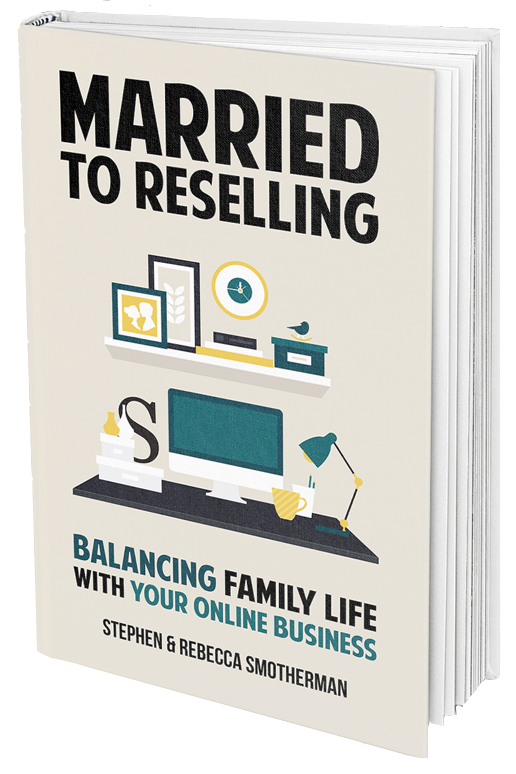Whether it is a business partner or your significant other, working with a partner can have a hugely positive impact on your Amazon business. In today’s episode, you’ll hear our advice for successfully working with a business partner, from communicating risk tolerance and prioritizing the personal relationship over the business relationship to managing your time together and scheduling regular meetings to make sure everyone is on the same page.
Working with a partner or spouse can really help grow your Amazon business, so tune in today to learn about the right ways to set up this business relationship so that you can see improved results in your sales and profits.
Listen on the podcast player below.
Like what you hear? Tell a friend… and be sure to leave us a rating and a review. Here’s how.
Key points from Episode 74:
 Why it’s important for both parties to communicate their risk tolerance up front.
Why it’s important for both parties to communicate their risk tolerance up front.- Finding a happy middle ground and prioritizing the relationship.
- The role that personality types play in business partnerships; playing into your strengths.
- Conversations you should have with your partner, starting with your goals for the business.
- Discussing scheduled time together with your partner who is also your significant other.
- Making sure you prioritize the personal relationship over the business relationship.
- How to prioritize continued communication: have regular meetings and open dialogue.
- And more!
Links and resources mentioned in this episode:
 Married to Reselling: Balancing Family Life with your Online Business
Married to Reselling: Balancing Family Life with your Online Business- Use the code BALANCE to get 50% off the Married to Reselling book
- How to Handle Amazon FBA Money Issues with Your Spouse
- Tips for Working with a Partner or Spouse at Amazon FBA
- How to Involve Your Kids in Your Amazon FBA Business
- Episode 27 – How Stephen & Rebecca Built Up Their Amazon Business
Right-click here and save as to download this episode to your computer.
 More Episodes from the Full-Time FBA Show podcast:
More Episodes from the Full-Time FBA Show podcast:
Don’t miss an upcoming episode! Subscribe, download episodes, and review the Full-Time FBA Show:
-
-
- Subscribe on iTunes
- Follow on Spotify
- Follow on Amazon Music (or just ask Alexa to “play The Full-Time FBA Show podcast”)
- Follow on iHeartRadio
- Subscribe on Podbean
- Subscribe on Podbay
- Subscribe on Podchaser
-
![]()
 Married to Reselling
Married to Reselling
Working from home sounds easy, but if you’ve done it for any amount of time, you know it can be difficult. In our book, Married to Reselling: Balancing Family Life with Your Online Business, my wife Rebecca and I will walk with you through ways we can all find success in balancing our time with family while working from home.
In this book, we tackle both the business and personal sides of life as a reseller, and we’ll help you explore a system that works best for you and your family. If you’re looking for ways to balance your family life with your online business and find success with both, then this book is for you. We also cover things like budgeting for success, dealing with an unsupportive spouse, involving your kids so they can develop an entrepreneurial spirit within themselves, and so much more.
Back to the main page for The Full-Time FBA Show
![]()
Episode 74 Transcript:
 [WELCOME]
[WELCOME]
[0:00:01.8] ANNOUNCER: Welcome to The Full-Time FBA Show. In each episode, it’s our goal to help you turn part time hours into a full-time income, selling almost anything on Amazon. Now, your hosts of the show, Stephen and Rebecca Smotherman.
[INTRODUCTION]
[0:00:21.0] REBECCA: Hello there, and welcome to this episode of The Full-Time FBA Show. We are on Episode 74, and today we’re going to be talking about working in your Amazon business with a partner. That could be a business partner, or it could be your spouse or significant other, but we’re just talking about working with someone else. Working with any type of partner, not working by yourself, how do you make that work, for a lack of a better word?
[0:00:47.4] REBECCA: Welcome to the show with me, Stephen, my cohost and my partner, both on this podcast and in our FBA business.
[0:00:53.3] STEPHEN: And in life.
[0:00:53.9] REBECCA: And in life.
[0:00:54.3] STEPHEN: Yes, good to be here, thanks for having me on the show.
[0:00:57.4] REBECCA: You’re welcome, thanks for being here. Glad you can make it.
[0:01:02.1] STEPHEN: Yeah, partnerships are really important to know and understand before you get into it, make sure you communicate ahead of time, and continue to communicate during the partnership so that, you know, success can be found and mistakes can be avoided. That’s what we’re going to talk about today in The Full-Time FBA Show podcast.
[INTERVIEW]
[0:01:22.7] REBECCA: Okay, as we’re getting started here, we’re going to be talking about different things that might come up if you are working with somebody else on your business if you are not a solo entrepreneur.
If you are working with a business partner, or you’re working on your business with your spouse, or even if you are just involving your spouse in certain aspects of your business, even if you’re the main person doing it. Stephen, what would you say is one of the most important things to talk about upfront if you’re in that kind of situation, whether you have already started a partnership or you’ve already involving your spouse or you’re thinking about doing it?
What would you say is one of the most important things to figure out where both of you stand on?
[0:02:05.9] STEPHEN: Yeah, I think it’s important for both parties to communicate the type of risk tolerance that they’re used to. I mean, especially when it comes to spending money. When it comes to buying inventory, there’s money involved. When it comes to waiting for the return on investment to finally come back, that money can cause some stress. Maybe more for one person and less for someone, but being able to communicate that risk tolerance is really important, especially if there is somebody who is running an Amazon FBA business and they’re adding a partner or their spouse is coming into the job.
There’s a lot of trust that needs to be earned and gained to be able to feel a little bit more comfortable at the beginning because different people have different risk tolerances. I know you and I, we have different risk tolerances and this is a conversation you and I have had multiple times.
[0:02:55.9] REBECCA: Yeah, I would add to that, it is mostly regarding money when you’re talking about risk tolerance, but there’s other areas too where you’re dealing with the concept of risk tolerance. Don’t just limit yourself to thinking about money because I would say that I probably am more risk verse when it comes to money. I like to have more of a buffer in our account, I’m usually more hesitant about spending large amounts of money.
There’s some other areas where I’m more willing to take some risks than you are. You just kind of have to work this things out.
[0:03:28.6] STEPHEN: Yeah, when you’re discussing these things, it’s good for both parties to realize that, at times, we’re going to need to forego our wants or desires for our spouse for their comfort level whether or not it’s, “Okay, I want to do something really big. I’m going to tone it back a little bit because my partner and my spouse is not as comfortable as I am,” or “there’s a time where I’m a little worried about going too big and I’m going to kind of meet them halfway and be able to give a little bit more leeway.”
There’s just a middle ground sometimes that you can meet and then continue that conversation throughout the business relationship to be able to come to a place where you find a happy middle ground that works for everybody. As always, especially when it comes to a marriage, the marriage relationship and if it’s a partnership, the friendship relationship is more important than the business. You want to make sure that that relationship is prioritized.
[0:04:21.6] REBECCA: Okay, let’s talk next about personality types. Like I just said, with my personality type, there’s some ways that I’m a little bit more risk-averse than you are but then also my personality type leads me to be more risk-tolerant in different areas.
Personality type really comes into play a lot where when it comes to working with other people. We each have our own individual personalities that interact in different ways with different people, and it’s really important in a business partnership, whether it’s with your spouse or anybody else, to make sure that you are learning about each other’s personality types, and learning how to work with one another, and how to really understand each other in the best way, and also communicate with each other in the best ways.
How would you say, Stephen, that whole concept of different personality types comes into play with how Amazon-related responsibilities are divided up within a business? Who does what in your business, based on personality?
[0:05:28.4] STEPHEN: Yeah, again, since everyone’s personalities are different, you know, this is something to kind of figure out for yourself but, you know, a lot of times, introverts work with extroverts and there is that balance that you have to work into.
I love going to garage sales and talking to people, selling garage sales, trying to negotiate a better price for something at a garage sale, or trying to track down a manager at a retail store to try to work a deal, whereas an introvert would be more, “I just want to keep to myself, spend my time, better use my time on things that I’m more comfortable with.” Being able to find your strengths and stick with you what your strengths are is good conversation to be able to be had.
I love doing retail arbitrage, Rebecca loves online arbitrage and so even things like that with your personality types of what you’re interested in when it comes to Amazon business, you can focus on finding out what you’re good at, what your strengths are, and do that. I love sourcing toys and games and Rebecca’s more interested in books or shoes, finding stuff in the kitchen, things like that. Being able to have those conversations might open up some opportunities for you to even grow your business because, if your spouse is not interested or your partner’s not interested in sourcing the same type of inventory items that you are, maybe another category will really open things up for them.
Maybe your spouse is really into camping, and so they start learning about how to buy and resell camping gear. All of a sudden, it adds a whole new aspect to your business but just keeping that conversation going will really help balance those personalities to find strengths in your business.
[0:06:57.1] REBECCA: Yeah, and then really embrace those strengths. Don’t view it as I’m – this was something that I personally had to learn after we started working together, that there were areas where I just really did not thrive in our business, and finally coming to the point of understanding, “That’s okay”.
There are areas where I do a lot better than Stephen does because of my personality. Embrace those strengths, divide the work up in ways that really play into each other’s strengths rather than expecting, “Well, I’m really good at this, why are you not?” Viewing it more as, well, “I’m really good at this and you’re really good at that,” so, duh! That’s how we need to focus.
[0:07:36.4] STEPHEN: Yeah, you don’t want to make a carbon copy of yourself with your spouse or partner when it comes to your business. You want to figure out those strengths and work in those.
[0:07:45.7] REBECCA: Okay, as we both know, we’ve talked about quite a bit here on the podcast and for years, on our blog as well, mindset is such an important aspect of running an Amazon business. What conversation would you recommend people having before they start working together with a partner?
[0:08:04.7] STEPHEN: You know, there is a lot of different ways and conversations to have about mindset, and this is also just a good conversation for you to even have with yourself before you talk with a partner or spouse about this. Are you going to treat your Amazon business like a business or like a hobby? You know, businesses, is the goal is to make money. Hobby is more like ending up probably spending more money on something if you treat it like a hobby, but what’s your goal?
Are you wanting to make money on the side or you just wanted to do something fun on the side? When it comes to the inventory that you purchased, are you looking for fast nickels or slow dimes? Are you looking for a fast terms or a little bit longer term investments for the inventory, because that is going to impact your sourcing strategies. Discuss these things with your partner, try to figure out and discuss that before money is involved.
This goes back to risk tolerance because sometimes you might have that overlap with the inventory that you’re purchasing but the mindset that you have is going to be really important for you to discuss. That way you know each other a lot better when it comes to this and can make better decisions, again, going back to your strengths and moving forward with that.
[0:09:08.4] REBECCA: Okay, so, this next question is probably going to be a little bit more focused on rather than just straight business partnerships, more on a type of partnership where you’re working with your spouse or a significant other. What kind of conversations in that situation would you say need to be had about just that additional amount of time that you’re going to be spending together, working together?
If it is a business partnership, you may work for a few hours a day and then say, “See you,” and not see him again until tomorrow, but if you’re working with a significant other or your spouse, you’re around each other a lot more during the day, beyond just how much time you are spending working. What kind of conversations do you recommend having in that type of situation?
[0:09:53.9] STEPHEN: Yeah, the more time you spend with somebody, obviously, the more potential there is for conflict. You want to make sure that you talk about the scheduled time that things are going to be done, and the work is going to be going on, and just have that in the back of your mind, that, “Okay, I might need to be a little bit more patient with my spouse with this opportunity that we have to make a business on Amazon.”
We spend time during the day, working together, and then we spend time the rest of the day just doing life together. There is potential for more conflicts, but the flip side of that is that there is also potential for more of an improved relationship, more of an intimacy, being able to spend more time together, know each other more, make memories together. That is there too. Just having that conversation knowing that you spend more time together.
The flip side of that is true also. I mean, if you are going to be mostly focused on retail arbitrage, you might actually have time when you’re spending less time together. You’re out doing retail arbitrage all day and not being able to spend time. You want to understand that balance and maybe plan activities to balance things. If you are spending a lot of time together, maybe plan some activities for each of you to do something separate.
Maybe one of you watches the kids while the other person goes and does something on their own and then trade and do the flip-flop where, now, you watch the kids so your spouse can go do something by themselves. Or, if you spend a lot of time apart, plan some date nights. After the kids go to bed, plan something special for you all to do. Make sure the relationship is the priority, and that’s what we’ve said from the very beginning.
Always make sure that the marriage relationship outweighs your business relationship in all of the decisions that you make.
[0:11:28.3] REBECCA: Okay, so as we’ve been going over all of these different topics, one thing that keeps coming up is communication and the type of communication that you need to have as you’re getting started in this type of partnership. Things that you need to talk about either before you start working together or in the very early stages, but communication is an ongoing thing. It’s going to be important no matter what stage you’re at.
What would say is the best way to prioritize that communication as you’re going along down the road long-term?
[0:11:59.1] STEPHEN: I mean I think the best thing that you can do to prioritize communication is to make sure of two things. Number one, that you have a regular time where you meet and discuss things and, number two, that you have the freedom to bring up things to discuss at any time. If there is a problem, if there is a concern, we need to have the freedom to bring it up to our spouse without fear of a broken relationship, without fear of someone getting upset or having their feelings hurt.
Say, “Hey, I just wanted to ask this business-wise but why did you do this? I want to help understand why you did that,” or “Why am I doing this? I want to share with you why I’m doing something.” Being able to communicate with that but then also setting up time to regularly talk about this. You know, my wife and I have a monthly budget/business goals type planning meeting and, at the very beginning, some of those meetings were pretty uncomfortable before we started kind of getting into a groove.
They’re uncomfortable because there’s just a lot of head-butting. We had different expectations, different schedule ideas, different types of buying decisions, all that kind of stuff but when we finally were able to start walking through and discussing our expectations, planning out our schedules, talking about, “Okay, which areas in our house are we going to have focus on work and which is going to be rest for family?” We’re able to talk about our mistakes.
We’re able to improve our workflow. We’re able to bring out concerns and patiently explain to each other for the tenth time that’s happened with both of us. We’ve had to explain something 10 times before the other person finally got it but we try to do it patiently, with honesty and kindness. Those are the two things. Making sure that something is on the schedule where you talk about things and then having the freedom to bring in things to discuss when they are needed.
[0:13:39.2] REBECCA: Okay, that’s really good. That communication really is the key for long-term success in your business, whether you’re married to the person that you’re working with or whether it’s a business partnership. You have to be open and honest with your communication and also in how you’re receiving that communication as well. Tell me, Stephen, about the latest promotion that we’ve got going on here at Full-Time FBA.
[0:14:02.7] STEPHEN: Yeah, we just recently updated one of our courses, called Married to Reselling. It’s all about balancing your family life with your online business. This is the third time we’ve updated this course and we’ve got a lot of really great feedback about it. You can find a coupon code for it if you go to the show notes page at fulltimefba.com/74. If you are interested in knowing more about the course, you can go to fulltimefba.com/married and this course will walk you through different ways to balance family life with your online business.
That included involving your kids, that involves more with time management, more with working with your spouse, the awkwardness of training your spouse, you know, all sorts of different aspects of your business we’ll walk you through with this course, Married to Reselling. We’re really looking forward to you checking it out and it’s going to be something that can help impact your family life and your online business.
[CLOSING CONVERSATION]
[0:14:56.6] REBECCA: All right, well that wraps up this episode of The Full-Time FBA Show. We would like to remind you as always that you could find the show notes and the transcript for this episode at fulltimefba.com/74. The number 74 because this is episode 74.
[0:15:12.3] STEPHEN: Next week on the show, we’re going to be talking about some really interesting Amazon statistics that will blow your mind. I feel like I had to say it that way.
[0:15:20.6] REBECCA: That’s very dramatic.
[0:15:21.6] STEPHEN: Yes, but there is a lot of really great encouraging Amazon statistics that are out there that have just been released, and it just gives us a really good perspective on the state of Amazon as an Amazon reseller, the future of Amazon. I just can’t wait to share these stats with you. We’ll talk about them next week on The Full-Time FBA Show.
[OUTRO]
[0:15:43.9] ANNOUNCER: That is all for this episode of The Full-Time FBA Show. So, head over to fulltimefba.com/podcast, where you will find the show notes and links from this episode. While you’re there, subscribe to our newsletter where you’ll get several free downloads of our popular and helpful Amazon FBA resources, including a free e-Book. Now, take action on what you have learned today so you can find success at turning part-time hours into a full-time income with Amazon FBA.
[END]

Leave a Reply